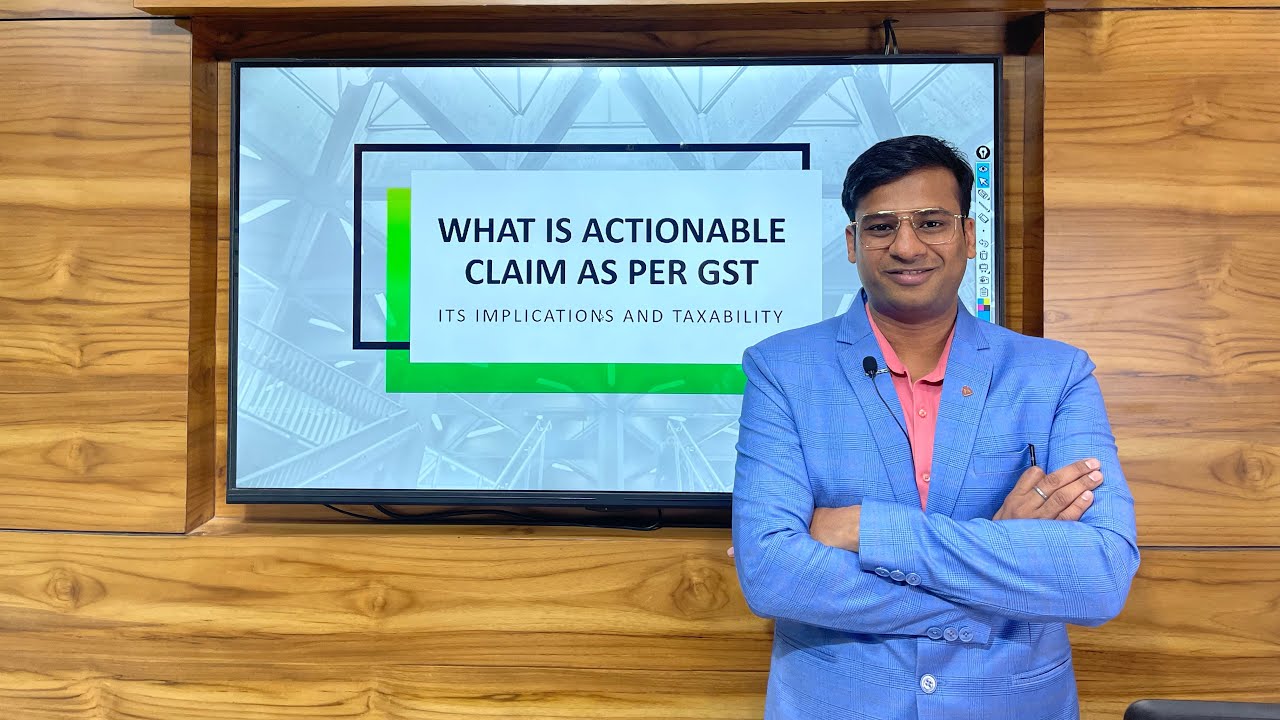Actionable Claims in GST: Definition, Scope, and Tax Implications
- 10 Aug 24
- 12 mins

Actionable Claims in GST: Definition, Scope, and Tax Implications
Key Takeaways
- Taxability under GST: Not all actionable claims are taxable; distinctions are made, such as taxing lottery tickets but not the transfer of unsecured debts.
- Taxability of Vouchers: GST implications vary based on the specificity of goods or services at issuance.
- Non-Actionable Claims: Claims secured by mortgage or hypothecation are not taxable under GST, underscoring the need for clear distinctions for compliance.
- Transfer of Actionable Claim: Involves GST considerations, focusing on taxable versus exempt transfers and place of supply rules.
- Legal Framework: The Indian Contract Act, 1872, and the GST Act mandate compliance across contractual and tax laws for actionable claims transactions.
Actionable claims in the context of the Goods and Services Tax (GST) in India are a particular type of movable property that is recognized by law. They include any right to a debt that is not secured by a mortgage on immovable property or a hypothecation or pledge of movable property, as well as any beneficial interest in movable property that the claimant does not actually own, either in whole or in part. The civil courts will recognize these as reasons for relief, no matter if the debt or beneficial interest already exists, is growing, is conditional, or is contingent.
What is an actionable claim under GST?

In simpler terms, an actionable claim is a right to any unsecured debt or to any beneficial interest in movable property that is not in the possession of the claimant. This category includes a wide range of financial instruments and rights, such as lottery tickets, betting, gambling, and other similar activities.
These are considered actionable claims because they represent a right to recover money or goods but do not involve the physical possession of the goods themselves. Under GST, certain rights are subject to taxation. The GST law specifically includes the transfer of claims (with some exceptions) in the supply of goods and services, making them taxable. However, it's important to note that not all rights are taxable under GST.
Actionable Claim Example
For example, the transfer of rights in the form of lottery, betting, and gambling is taxable, but other actionable transactions, like the transfer of an unsecured debt, are not subject to GST. This distinction is crucial for businesses and individuals dealing with financial instruments or rights that fall under the category of transaction.
Knowing whether a particular transaction involving a right is subject to GST is essential for compliance and accurate tax reporting.
Illustrations of Actionable Claim in GST
Lottery Ticket
Lottery tickets are a classic example of actionable claims. When you purchase a lottery ticket, you're acquiring a right to a potential future benefit (the lottery prize) based on the outcome of a random draw. This right does not involve the physical possession of goods but represents a right to receive money or money's worth, making it a transaction under the GST regime.
Transfer of Unsecured Debt
The sale or assignment of a debt obligation without collateral is known as the transfer of unsecured debt. For instance, if a financial institution sells a portfolio of unsecured personal loans to another entity, this transaction involves the transfer of actionable rights. The buyer of the debt acquires a right to collect the debts from the original borrowers, which constitutes an actionable transactions.
Securitization of Debts, Mortgage
Securitization is a financial process where certain types of assets, such as mortgages or other receivables, are pooled together and transformed into marketable securities that can be sold to investors.
In this context, the rights to receive payments from the underlying debts or mortgages are bundled and sold as securities. This process turns future debt repayments into a right that can be bought and sold in the financial market.
Beneficial Interest in Movable Property
A beneficial interest in movable property refers to a situation where a person has an entitlement to the benefits of a property (such as arrears of rent income or profits) without being the legal owner of the property.
For example, if a person has a trust that owns a car and the income generated from leasing that car is designated for another person (the beneficiary), that beneficiary holds a beneficial interest in the movable property (the car). This right to the benefits derived from the property is considered a transaction.
Taxability of Vouchers
Vouchers, which can be redeemed for goods, services, or a discount, also constitute actionable rights. They represent a right to receive a service or a good in the future. Under GST, vouchers are treated distinctly based on whether they are identifiable at the time of issuance or not.
If a voucher clearly specifies the goods or services to be provided upon redemption, it is treated as a supply of those goods or services, with GST implications based on the nature of the goods or services specified. This treatment underscores the taxability of vouchers as actionable transactions within the realm of GST.
What are non-actionable claims in GST?
A non-actionable claim in the context of Goods and Services Tax (GST) refers to any transaction or right that does not fall under the category of "actionable claims" as defined by the GST laws and regulations.

Non-actionable claims are essentially types of transactions or rights that are not recognized under GST for the purpose of taxation. This distinction is crucial because it determines whether a particular transaction involving transactions or rights over property or debts is subject to GST.
Unlike actionable claims, which include rights to unsecured debts, lottery tickets, and other rights to accept money or goods without possessing them, non-actionable claims do not confer such rights or are specifically excluded from the definition of actionable under GST legislation.
Examples of non-actionable claims could include:
- Rights that are secured by a mortgage of immovable property or by hypothecation or pledge of movable property: These are typically outside the ambit of actionable claims because they involve a security interest in physical property.
- Rights that do not involve the transfer of a beneficial interest in movable property not in possession: If an acceptance or right does not entail the transfer of such an interest, it might be considered non-actionable under GST.
- Rights that are not recognized by civil courts as affording grounds for relief: For an acceptance to be actionable, it typically needs to be recognized by law as providing a basis for legal action. Those that do not meet this criterion are non-actionable.
Non-actionable claims are significant in the context of GST because they highlight the types of transactions that are not subject to GST, providing clarity for businesses and individuals regarding their tax obligations. Understanding the distinction between acceptance and rejection is essential for accurate GST compliance and financial reporting.
Transfer of an actionable claim
The transfer of actionable rights refers to the process of transferring the rights from one party to another. In the context of Goods and Services Tax (GST), this concept is particularly relevant because it deals with the movement of rights over debts, benefits, or other non-physical assets, which can have tax implications.
The Process of Transfer
The transfer of actionable rights from one party to another can occur in several contexts, including but not limited to:
- Selling or assigning debts: A creditor can sell or assign the right to collect a debt to another party. This transaction involves the transfer of actionable things because the buyer steps into the shoes of the original creditor and gains the right to accept the debt.
- Lottery tickets: When a person sells a winning lottery ticket to another, they are transferring the actionable items to the lottery winnings.
- Beneficial interests in trusts or estates: The rights to benefits from trusts or estates can also be transferred, constituting the transfer of actionable rights.
GST Implications
The transfer of actionable claims has specific implications under GST. While the GST framework includes the supply of goods and services, certain transfers of actionable things are also considered supplies and thus can be subject to GST.
However, the applicability of GST depends on the nature of the acceptance being transferred.
- Taxable and exempt transfers: Some transfers of actionable things are taxable under GST, while others may be exempt. For example, the transfer of lottery tickets is generally taxable, but certain other transfers, like debts, may not be.
- Place of supply rules: Determining the place of supply is crucial for understanding the GST implications of transferring actionable claims, as it influences which jurisdiction's GST laws apply.
Law on Actionable Claims
The law on actionable claims is an important aspect of legal and financial regulations, encompassing various legislations that define, regulate, and govern the transfer and enforcement of these rights. Applicable claims are recognized under both the Indian Contract Act, 1872, and the Goods and Services Tax (GST) Act.

These laws provide the framework for understanding what constitutes these factors, how they can be transferred, and their implications for taxation under GST.
Indian Contract Act, 1872
Under the Indian Contract Act, 1872, an applicable right is defined as a claim to any debt, other than a debt secured by mortgage of immovable property or by hypothecation or pledge of movable property, or to any beneficial interest in movable property not in possession, either actual or constructive, of the claimant, which the Indian courts recognize as affording grounds for relief, whether such debt or beneficial interest is existent, accruing, conditional, or contingent.
The Contract Act primarily deals with the transferability of these law, stipulating that actionable rights can be transferred from one party to another, subject to certain conditions. The Act ensures that the rights and obligations associated with actionable rights can be legally enforced, providing a mechanism for creditors to sell or assign their acceptance to others.
Goods and Services Tax (GST) Act
The GST Act, which came into effect on July 1, 2017, brought claims under the ambit of tax, specifically in the context of supply. According to the GST legislation, the supply of goods and services includes applicable demand, excluding betting, gambling, and lottery.
This inclusion under the GST framework means that certain transfers of actionable claims are subject to GST, depending on the nature of the rights. For instance, while the transfer of lottery tickets, which is an actionable claim, is taxable under GST, other actionable claims like the transfer of unsecured debts are not subject to GST.
This distinction is crucial for businesses and individuals dealing with actionable claims, as it determines their tax liabilities and compliance requirements.
Legal and Tax Implications
The legal framework surrounding actionable claims requires careful navigation to ensure compliance with both the Indian Contract Act and the GST Act. Businesses and individuals engaging in transactions involving actionable assets must understand the legal definitions, transferability conditions, and tax implications.
For tax purposes, the categorization of a transaction involving an actionable rights as a supply of goods or services under GST law affects how it is taxed. Stakeholders must be aware of the specific provisions and exemptions under GST to accurately assess their tax liabilities and ensure compliance.
Conclusion
The intricate landscape of claims within the GST framework presents both challenges and opportunities for businesses and individuals. Understanding the nuances of what constitutes an actionable rights, its tax implications, and the legal processes involved in its transfer is paramount for navigating the GST regime effectively.
This knowledge not only ensures compliance with the law but also enables stakeholders to make informed decisions regarding their financial and legal undertakings.
💡Forgetting to pay your GST payment on time. Don't worry; take the first step and download the business payment PICE application, which helps schedule timely payments. To learn more, talk with one of our experts for a demo session of our app.



















